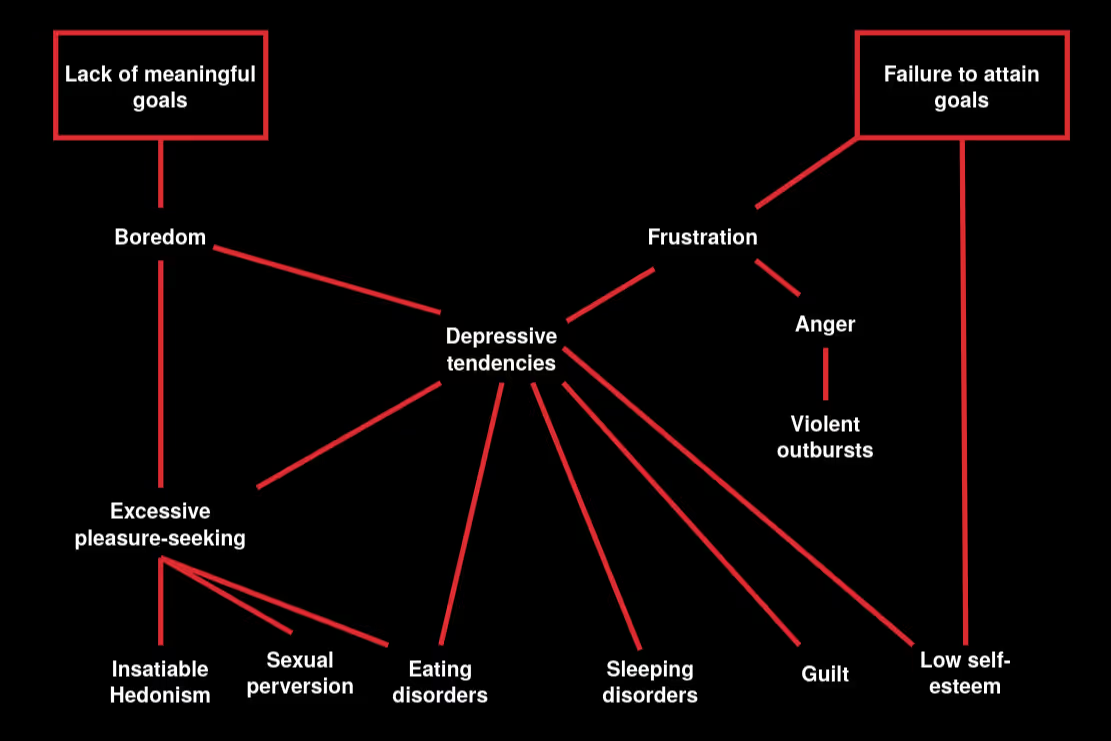For those living in technologically advanced countries, we have countless machines that provide us with numerous comforts and make acquiring our basic needs an inconsequential part of our day. At the same time, there is widespread depression, anxiety, frustration, and low self-esteem that is observable in such countries [1] [2] [3]. The primary reason for this recent development is because the technological system has come to greatly disrupt what is known as ‘the power process’. The power process is the process of creating a goal, making a meaningful effort to achieve it, and doing so with a degree of autonomy [4]. Experiencing it results in a sense of achievement, and satisfaction as well as a furthered sense of self-esteem. All of these elements are crucial for a person’s psychological well-being. However, the very nature of the technological system greatly impedes this natural process causing the widespread psychological suffering seen today.
Every person is driven by this goal-seeking behavior. Even if no conscious goals are held, we possess unconscious goals [5]. In the process of attaining their goal, a person receives positive/negative feedback that increases/decreases their anticipation and thus, incentivize/de-incentivize them to continue pursuing the goal. This feedback comes from how they self-assess the effort they’re expending, the autonomy they are able to exercise, and the progress they’ve made towards the goal. These self-assessments continue throughout the process of attaining the goal and if conditions are right, result in rising anticipation leading to a prolonged feeling of satisfaction [6]. It’s also the case that this anticipation derived from progress towards the goal is also more important than the completion of the goal itself [7]. These self-assessments also impact how someone whether they see it as an achievement or not. Furthermore, these assessments determine the self-esteem someone can develop from attaining a goal. For these conditions to be right, autonomy and effort must be present. Without these essential components, nobody would be able to experience the power process.
Autonomy
Before covering autonomy, it should be noted upfront that the level at which a person needs autonomy to complete the power process can vary depending on their personality. That said, the contents discussed in this section apply to the majority of people. Autonomy has been identified as a key element of psychological well-being by motivational psychologists. Abraham Maslow listed autonomy as an element of self actualization [8] and a key element of self-determination theory (SDT) is autonomy [9]. There are two ways someone can exercise their autonomy: choosing a goal, finding how a goal will be attained.
It’s well known that if someone finds a way to complete a goal on their own, they will earn far more confidence and achievement afterward as opposed to having the process to attain the goal spelled out for them. This is because being able to set the manner in which a goal is completed greatly influences how someone self-asses the contribution their skills/knowledge made towards a goal’s completion. If they assess that their contribution was of significance, then they develop a sense of achievement and if they feel that their own competence determined the outcome, their self-esteem will improve. But if they are unable to work towards their goal autonomously, they will become unsure if they could attain a goal without aid [10]. This results in an inability to increase self-esteem and self-confidence. They will come to assess that it was another person’s contribution (indirect or direct) that was of significance and as such, no sense of achievement will occur. In cases where a large number of people are involved (to the point that a single person’s contribution does not feel significant) the problem only becomes more acute [11]. Many people today find it impossible to find careers where much autonomy is given – if any. So many rules and methods need to be followed to every detail in so many modern jobs. Disciplinary action is handed out to those who exhibit idiosyncratic behavior because it weighs down productivity. If each person was able to choose the manner in which they completed their work, it wouldn’t allow the technological system to function smoothly. And because of the vast sizes of self-propagating systems today, they need to strip people of their autonomy to even function at all.
Being able to exercise autonomy in choosing goals greatly impacts how someone values the goal and subsequently, their anticipation and sense of achievement. In SDT, Edward Deci and Richard Ryan put forward that there are two kinds of goals: those that are pursued – regardless of what the reward is (intrinsic), and those that are pursued to acquire a reward (extrinsic) [12]. They argued that intrinsic goals are motivated by certain inherent tendencies towards growth and core, innate emotional needs while extrinsic goals are those pursued for the sole reason that it may result in getting a material or social reward. Furthermore, they propose that the motivation to achieve intrinsic goals is stronger than that of extrinsic goals. Whether a goal is intrinsic or extrinsic defines how someone views the goal and subsequently, the level of anticipation they develop for it. Because they originate from the self, intrinsic goals must be created autonomously as opposed to extrinsic goals that come from outside the self and thus, not created autonomously [13]. It has also been shown that intrinsic goals can be transformed into extrinsic goals if the rewards for attaining the goal change as to alter the reason why someone pursues it [14]. If you take a subsistence farmer who receives a sense of security and growth from his work and turn his farm into a commercial farm, such intrinsic elements will disappear. As a commercial farmer, he is bound by obligations to pay off the debt accrued to purchase his modern farming equipment and large acreage farms [15] and to turn a profit, he must farm in the most efficient manner, devised by technicians (these elements end up also stripping him of his autonomy). All his efforts end up as being in service of material accumulation and not in service of fulfilling any inherent tendencies.
Effort
The most consequential element determining if a person experiences the power process is the effort exerted in completing a goal. The effort expended is determined by someone’s ability in relation to the ability required to attain the goal. Goals that require a challenging degree of effort give a great sense of achievement [16] and competence [17]. Competence is the ability to effectively engaging with our environment to produce results and the more thoroughly someone utilizes their abilities, the more satisfaction can be gained [18]. Historically, our goals have primarily consisted of those requiring meaningful effort. Physiological, and social needs required strength, skill, attention, knowledge, and persistence that enabled people to experience the power process.
If someone does not asses that they are expending a moderate amount of effort in completing a goal but only a small amount of effort, then only a small reward will be given. This leads to an inability to experience the power process. This is the case, even if the abilities utilized are considerable when assessed by other people. For example, a person that does not run often will likely need to utilize all their strength and energy to run a 6 minute miles, but they will earn far more satisfaction than a professional runner who did not need to exert as much effort. A majority of modern professions require an individual to learn a set of procedural skills and develop knowledge that hardly changes. When these have been learned, an individual has hardly any remaining challenges before them [19]. Even when the skill or knowledge possessed seems to be exceptional, it’s commonly due to the esoteric nature of the technique or piece of information that was utilized. This is a phenomenon brought about by hyper-specialization. If too many of an individual’s goals lack a need for meaningful effort, it can quickly lead to boredom, hedonism, and depression [20]. Because of the simple, procedural nature of our work, all effort that’s needed is to show up on time and put in the minimum amount of effort needed to complete given tasks [21]. Outside of work, little chance is available to pursue goals that meet our basic needs while also requiring meaningful effort. Getting food is now such an easy task it’s now considered a chore instead of an integral part of our day. It’s an afterthought reserved for when the pantry or fridge starts to empty out. Goals that are intended to meet our social needs are progressively being cheapened as well. Texting enables us to easily talk to others at our own convenience – but it doesn’t even provide the ability to meet our social needs [22]. It’s also possible to replace talking to or messaging a human with a chatbot. They offer on-demand conversations and unrealistic relationships as the AI is often designed to tailor their responses to the user’s personality [23].

Conversely, if the goals set by an individual are impossible to accomplish (either due to the goal requiring unrealistic abilities or environmental limitations) then the individual will become frustrated by a lack of progress made towards their goa [4]. Continual frustration can build a sense of pent-up anger causing someone to become irritable. If someone is continuously frustrated while also not being able to experience the power process, it may result in an individual lashing out at other people or their environment [25]. However, for most, experiencing persistent frustration tends to make an individual fall into depression and defeatism. This is because our brain utilizes past experiences to incentivize and prioritize goals that receive positive outcomes and will tend to ignore undesirable outcomes. This helps keep an individual from pursuing a goal that yields no results or negative results. However, if an individual experiences no positive experiences and only negative experiences, they will pursue no course of action and fall into a state of depression and apathy [26] [27].
This behavior has been extensively studied by psychologists and in his groundbreaking work Learned Helplessness, Martin Seligman studied how dogs with different experiences responded to electric shocks. His control group was composed of dogs who were subjected to electric shocks but could stop their administration if the dogs pressed a button with their nose. The experimental group was also given electric shocks – but no possibility of escape was given. Both groups were then put in a chamber that had a divider the dogs could jump over. They were then subjected to additional shocks but if they jumped over the divider, they were able to escape the electric shocks. It was found that the dogs in the control group were far more likely to jump over the divider compared to those in the experimental group. Those in the experimental group tended to simply suffer repetitive shocks while often doing little more than whine [28]. And like the dogs in the experiment, modern man is one that has been broken down to the point of submission. So many goals have become impossible due to either technical limitations or because of laws and regulations. As stated above, if each person tried to exert autonomy while completing their work, the technological system would not function efficiently or coherently. The reason we have so many laws and regulations is that they are key in maintaining societal structure. This has the consequence of making modern man one that is frustrated, depressed, and lacking self-esteem.
To summarize, the technological system makes accomplishing our goals either insultingly trivial or makes them impossible resulting in numerous psychological issues that can become debilitating. This is not a result of some unfair authoritarian policy or any specific piece of technology but it’s the manner in which the technological system functions. As Kaczynski mentioned, you can’t eat your cake and have it too. If the technological system persists, we will be continually subjected to these degrading and undignifying conditions that suffocate the pursuit of happiness. And if the technological system grows, the problems associated with it will only grow alongside it. All of this is dependent on the continuation of the technological system and as such, is more than a sufficient justification for bringing its end through an anti-tech revolution.







